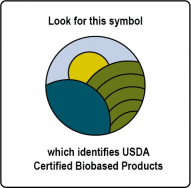USDA BioPreferred® Program Application
Measuring % Biobased Carbon Content by ASTM D6866 analysis
We welcome inquiries on ASTM D6866 biobased content testing.
Request PricingUSDA Certified Biobased Application Reminders:
- Before submitting your samples, please consult directly with the BioPreferred Program.
How to apply for BioPreferred Certification? - Make sure your Biobased Participant Agreement has been signed and accepted.
- Results obtained in advance of the signed agreement and acceptance into the program will not be accepted by the USDA.
SGS Beta is not affiliated with the USDA or the BioPreferred Program.
Ready to submit samples for ASTM D6866 analysis?
1. Prepare the required sample size and containers

SGS Beta has a general guideline for biobased products sample size requirements. However, due to the sub-sampling conditions specific to the BioPreferred Program, we highly recommend that you contact an SGS Beta account manager in your region.
After you sign the Participant Agreement, the BioPreferred Program will instruct you to contact us to discuss the details of the analysis, including appropriate quantity to send and where to send it.
Is sub-sampling allowed?
| The USDA Certified Biobased application will ask you to list your product as: | Definition | Is sub-sampling allowed? | SGS Beta Lab Notes |
|---|---|---|---|
| Intermediate | A raw material which is sold, then modified or used in making a “retail” product which is then purchased by the consumer | Yes (in any appropriate packaging) | We will take a picture once we receive your sample in our Miami lab. |
| Retail | A product that is purchased directly by the consumer or is packaging used “as-is” to contain a product purchased by the consumer | No (send product in its final consumer packaging) | We are required to take a picture of this as third-party validation of what was analyzed, i.e. the result was obtained on material taken from the same container shown in the photo. |
NOTE: You cannot sub-sample and take a picture yourself. There is no self-declaration option for retail product sub-sampling at this time. If you would like to sub-sample a retail product before submitting it to us, please consult the USDA BioPreferred Program.
Does your product have a hazardous component?
Please ensure that your products can be safely disposed of in the state of Florida. For example, bleach is okay but certain solvents are not. If in doubt, please consult us before submitting the sample.
REMINDERS:
SDS Required – Chemicals must include SDS/MSDS. You can email a copy to your SGS Beta account manager or upload it to your online data sheet.
Packing Materials – When sending intermediates in vials, you may use coarse-grade vermiculite or other materials with paper-based filling. Do not use vermiculite powder.
Packaging – Please send samples in sturdy boxes instead of envelopes to protect the vials and Ziploc bags from being crushed while in transit.
Heterogeneity issues – Results will only be representative of the actual material analyzed. Heterogeneous materials should be discussed with the laboratory prior to analysis to ensure the sample is representative of the whole product.
Presence of Carbonates – The lab needs to know if your product contains carbonates. Discussion must be pursued prior to analysis to ensure accurate results.
ASTM D6866 requires carbonate components to be excluded from the biobased content result. Special procedures are required for materials containing carbonates. Contact the BioPreferred Program (biobasedtesting@im-strat.com) with any questions on testing samples with undetectable or encapsulated inorganic carbon.
SGS Beta doesn’t accept samples with artificial isotopes.
2. Fill out SGS Beta’s submission form
Our Services & Turnaround Time
Standard Service – results are reported in 7 business days or less
Priority Service – 4 business days or less
Choose the correct form.
Use our “Biobased & USDA Samples” form.
Add your USDA Application Number and the Documentation of Sample Selection by Manufacturer/Vendor forms. These forms are attached to the email notification you will receive from the USDA BioPreferred Program.
Let us know if your samples have volatile components or carbonates.
3. Ship samples to Miami, Florida, or to our forwarding offices
See our US address and forwarding offices in the UK, Europe, China, Japan, Korea, and Taiwan.
Contact us before sending your samples to any of our international forwarding offices for instructions. The shipper is responsible for handling the administrative requirements to release the shipment.
Note: SGS Beta does not cover import customs fees, duties, or taxes for client shipments. These charges are the sole responsibility of the client. For any customs fees charged to SGS Beta’s account, the client will be invoiced a $50 handling fee. The custom fees will be passed on to the client in addition to the handling fee. SGS Beta will not process any claims on behalf of the client with the courier in relation to the fees.
To avoid unexpected charges or delays, we recommend using DDP (Delivered Duty Paid) shipping whenever possible, so that all customs fees are prepaid by the shipper.
All hazardous materials (containing combustible elements) must adhere to International Air Transport Association (IATA) regulations; details can be found in the Fedex Packaging Dangerous Goods section.
Email Confirmation – An SGS Beta representative will confirm the safe arrival of your package and the delivery date for your results. NOTE: Our quoted turnaround time starts following the day we receive your samples in Miami, excluding weekends. Samples delivered after 3:00 PM EST will be logged the following business day.
For details on customs declaration, de minimis shipping, and other information, please visit our FAQ page.
REQUEST PRICING
We offer standard and priority services for ASTM D6866 testing to all USDA BioPreferred applicants.
Contact UsPage last updated: December 2025